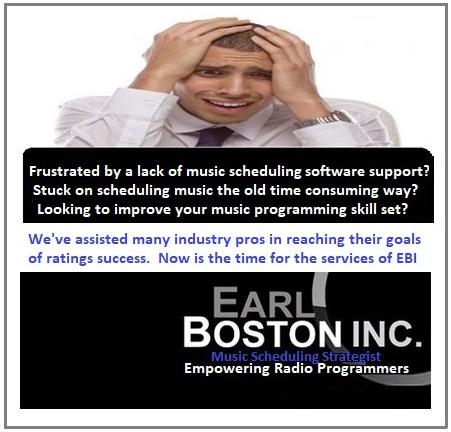SERVICES OF EBI
The points below explain in detail the many services we provide for the radio industry:
A Proactive Approach: EBI periodically reviews and monitors station database libraries then contacts each station to inform them of music scheduling inefficiencies. Music-scheduling software companies do not offer this level of personalized services specifically designed to meet the mindset of the programmer. Furthermore, basic technical support is geared to solve a problem after it has occurred.
We offer a personal proactive approach by regularly monitoring a station’s library, categories, rule settings and rotations and super-serve the client’s needs which results in an improved music log file that is generated by the software rather than manually by the user… saving valuable time in the process. If not monitored song coding, rule settings, and category rotations have a tendency to fall apart. From today’s over multitasking approach to programming, to changes in staff, a diminished focus on the music, the most import aspect of a music formatted station, is lost. Why are hours wasted manually adjusting, replacing, and juggling songs on the log editor. Furthermore, the human eye cannot catch all incorrectly scheduled song positions. This is the assignment of the individual rule that’s applied to execute a specific chore.
Common Scheduling Inefficiencies: A common inefficiency is inconsistent data entry of recommended song screen fields. The fields that support proper song-to-song transitions are vital and work to offer the listeners additional variety. This is key especially for current based Top 40 or Urban Mainstream formatted stations with fast category rotations.
This is the job of the attribute rules and the variety stems from supplying different sounds for each quarter hour. These sounds are controlled by song attributes. One for example is the Role. It controls the number of female, male, collaboration or duet coded songs that plot in a row, or in contrast, songs that are properly separated from each other. The more music variety for the listener equates in a greater chance of increased cume.
Station Reports: We provide quarterly Station Analysis Reports that outline specific and needed database refinements. For music-scheduling software to schedule effectively, all I’s must be dotted and all T’s crossed on a consistent basis.
Analyzing a station’s database from top to bottom on a routine basis ensure that the programmer’s product is intact. The music is a vital part of a station’s brand. This level of detailed music library focus is needed and most commonly overlooked. This added level of database monitoring allows the programmer time to handle other pressing office requirements.
Music Category Rotations: We monitor each music category to make sure all song titles are receiving proper exposure throughout all available dayparts. This reinforces the programmer’s desire to achieve his or her required hourly and daily music category average projected turnover.
Songs in the Stay Current, Recurrent and Gold categories have a tendency to increase in total count as songs trickle down from the current categories. If the song counts of these categories are not monitored their rotations will lessen and not meet the required hourly or daily turnovers requirements. Some of the older songs will need to be rested, while others will remain relevant, however what’s important is a consistent music category song supply that correlates with each clock and music category demand.
The Creative and Technical: As a former program director and years of studying and utilizing the most popular music-scheduling programs, I’ve been able to marriage the programmer’s creative and artistic concepts with that of the technical aspects of music scheduling software. We work to implement the programmer’s philosophy into the software’s technical settings.
Adjusting to the needs of the individual programmer helps them work more comfortably, efficiently and reinforces their confidence. In the end this equates to better workflow and improved time management.
Unique Software: Unlike other software programs including word processors or spreadsheets, music-scheduling software is uniquely different. The rules in the software alone must be adjusted periodically to meet the changes in the music.
Here’s an example: If a new song has 4 featured artists, specific rules should be set to separate the new song, from all others songs by each of the 4 featured artists, within the library regardless of the category they may reside in, by a specified amount of time.
Additional Reports: The BDS or Mediabase Report is maintenance step that helps protect each station’s FCC license. This report compares the corporate programmer’s station playlist, with that of each regional programmer’s playlist following weekly category rotation updates.
This type of review works to reveal the actual songs being played and helps prevent unnecessary or unwanted songs from scheduling along with reducing play favoritism of certain titles.
Superior Support: 24/7 customer support is the cornerstone of EBI. Support offered by others is far less personal. If the support person is not familiar with the station or the programmer… time will be wasted in the translation and understanding of the individual programmers requirements and their needs.


